Capella University’s RN to BSN program offers a flexible path for registered nurses aiming to enhance their qualifications. With online courses tailored for working professionals, you can advance your nursing career while balancing your job and personal life. This program focuses on improving your skills in patient care, management, and health outcomes, empowering you to make a significant impact in the healthcare field.
Enrolling in the RN to BSN program gives you access to a curriculum that blends core nursing concepts with specialized knowledge.
This prepares you for greater responsibilities and leadership roles in various healthcare settings.
The program emphasizes continuous improvement and lifelong learning, helping you stay current in the ever-evolving nursing profession.
In addition to academic growth, the skills you develop through Capella’s program can lead to better job opportunities and career advancement.
As healthcare continues to evolve, having a BSN becomes increasingly important, setting you apart in a competitive job market.
Overview of Capella RN to BSN Program
The Capella RN to BSN program focuses on advancing your nursing career while enhancing your skills and knowledge.
This program bridges your existing experience as a registered nurse with a Bachelor of Science in Nursing, helping you improve patient care practices and broaden your professional opportunities.
Transforming Nursing Practice
In the RN to BSN program at Capella University, you will learn to apply evidence-based practices in patient care.
The curriculum covers essential areas, such as patient-centered care, leadership skills, and health informatics.
You will also explore topics like:
- Healthcare Quality Improvement: Understanding how to enhance health systems and patient outcomes.
- Community Health: Focusing on population health and preventive care strategies.
These elements aim to transform your approach to nursing practice and prepare you for various roles in the healthcare field.
Program Structure and Requirements
The RN to BSN program is designed for registered nurses who hold an active and unrestricted RN license.
You will need to complete around 180 quarter credits to earn your degree.
Core Program Requirements include:
- GuidedPath and FlexPath Options: Choose a traditional schedule or a self-paced model.
- General Education Courses: Complete courses that support your nursing knowledge, such as psychology and statistics.
The program integrates online coursework with real-world applications, promoting flexible learning tailored to your lifestyle.
For more details, visit Capella University’s program page.
Curriculum and Specializations

Capella University’s RN to BSN program features a structured curriculum that enhances your nursing skills and knowledge.
The program includes foundational courses, core nursing content, and a capstone project, allowing you to tailor your education to meet your professional goals.
Foundation and General Education Courses
The program begins with Foundation and General Education courses.
These provide essential knowledge in areas like psychology, sociology, and communication.
You will complete general education requirements that are crucial for developing a well-rounded nursing practice.
Key areas include:
- Basic Psychology: Understand patient behavior and mental health.
- Sociology: Grasp social influences on health and illness.
- Communication Skills: Enhance your ability to interact effectively with patients and families.
These courses prepare you for more specialized nursing content by establishing a strong academic base.
Core Nursing Courses and Electives
Core Nursing courses focus on advanced nursing topics, patient care, and health systems.
You will engage in courses such as Evidence-Based Practice, Nursing Leadership, and Population Health.
Additionally, you can choose Elective Courses to explore areas like pediatrics, gerontology, or mental health.
Core Course highlights:
- Evidence-Based Practice: Apply research to improve patient outcomes.
- Nursing Leadership: Develop skills to manage teams and influence change.
- Population Health: Learn to address health disparities in communities.
Electives allow you to customize your studies based on your interests and career objectives.
Capstone and Project-Based Learning
The capstone course is a vital part of the RN to BSN program.
It involves a significant project that integrates your learning and showcases your skills.
You will work on real-world problems in a professional setting.
Capstone Features:
- Project-Based Learning: Focus on practical applications of nursing theory.
- Community Engagement: Collaborate with healthcare organizations to impact patient care.
- FlexPath and GuidedPath Options: Choose a learning style that fits your needs.
This course not only solidifies your knowledge but also prepares you for advanced roles in nursing and healthcare leadership.
Learning and Assessment Methods

Capella University offers diverse learning and assessment methods to accommodate different student needs.
You can choose either the self-paced FlexPath or the structured GuidedPath, each providing unique ways to engage with course material and demonstrate your competency.
FlexPath: Self-Paced Learning
In the FlexPath model, you have the flexibility to set your own schedule.
This allows you to complete assignments at your pace, which is ideal for busy nursing professionals.
You can take as many courses as you want in a term, depending on your ability to manage your time effectively.
The self-paced approach emphasizes critical thinking and evidence-based practice, ensuring you acquire essential skills.
To succeed, focus on mastering each course’s learning outcomes before moving on.
This method encourages the practical application of knowledge, helping you build a strong foundation for your nursing career.
GuidedPath: Structured Learning
The GuidedPath offers a more traditional classroom experience with set course schedules.
Here, instructors guide you through the curriculum, providing support and deadlines.
This structure can be beneficial if you prefer a clear pathway and regular feedback.
You are still encouraged to develop skills in information literacy and critical thinking.
Courses typically last 10 weeks, giving you ample time to engage with peers and instructors.
Group projects and discussions enhance your learning experience and help you understand different perspectives in nursing practice.
Assessment and Demonstrating Competency
Capella uses various assessment methods to ensure you demonstrate your competency.
In the FlexPath model, assessments typically include self-paced exams, projects, and reflective assignments.
These assessments allow you to showcase your understanding of nursing concepts and the ability to apply them in real-world situations.
You will also be expected to engage in self-paced demonstrations to prove your skills.
In the GuidedPath, assessments may include quizzes, essays, and presentations, providing a comprehensive evaluation of your progress.
Both methods emphasize the importance of evidence-based practice to ensure you are prepared for the complexities of nursing.
Professional Practice and Continuous Improvement

In nursing, professional practice emphasizes continuous improvement through evidence-based decisions, quality enhancement, and effective use of technology.
These aspects play a crucial role in ensuring patient safety and improving the quality of care.
Evidence-Based Decisions in Nursing
Making evidence-based decisions is essential for ensuring effective patient care.
This approach relies on data and research to guide clinical practices and improve outcomes.
By utilizing the Evidence-Based Practice Model, you can assess current research, patient preferences, and clinical expertise.
To implement this effectively, consider these steps:
- Identify problems: Recognize areas in care that need improvement.
- Research: Gather reliable data and studies related to the issue.
- Apply findings: Integrate the evidence into your practice.
Using evidence to inform decisions leads to better health outcomes and enhances population health initiatives.
By adopting this model, you foster a culture of continuous learning and improvement.
Quality Improvement and Patient Safety
Quality improvement (QI) aims to enhance patient care by systematically addressing areas of weakness.
This involves assessing and modifying processes to reduce errors and improve safety.
Key strategies include:
- Regular assessments: Monitor patient care processes.
- Data analysis: Use metrics to track progress and identify trends.
- Feedback loops: Incorporate patient and staff feedback to improve care.
Implementing a QI framework can enhance patient-centered care.
This ensures that care is tailored to individual patient needs, promoting satisfaction and safety.
Engaging all healthcare team members in quality initiatives can lead to a comprehensive approach to enhancing care and managing health information effectively.
Health Care Technologies and Informatics
Healthcare technologies and informatics are crucial in modern nursing practice.
They enable you to manage patient information securely, streamline workflows, and enhance decision-making.
Utilizing these tools can improve efficiency and lead to better patient outcomes.
Key technological advancements include:
- Electronic Health Records (EHRs): Facilitate easy access to patient data.
- Telemedicine: Increases access to care for patients in remote areas.
- Clinical Decision Support Systems (CDSS): Provide evidence-based recommendations during patient interactions.
By employing these technologies, you can continuously improve the quality of care delivered to patients and ensure their safety.
Staying informed about advancements in technology helps you adapt and thrive in an ever-changing healthcare landscape.
Career Advancement and Lifelong Learning
Investing in your education with the RN to BSN program can significantly impact your career in nursing.
By enhancing your skills, you increase your chances for leadership roles and further specialization in the field.
Leadership Skills and Advancement Opportunities
A BSN prepares you for various leadership roles within healthcare settings.
With strengthened professional nursing practice, you can take on responsibilities that require decision-making and management skills.
Skills gained include:
- Interprofessional collaboration: Working with diverse healthcare teams to improve patient outcomes.
- Teamwork: Leading nursing teams effectively to ensure quality care.
Many BSN programs also offer an Accelerated Master’s Pathway.
This path allows you to pursue your Master’s degree while completing your BSN.
This can fast-track your journey into advanced nursing roles, such as Nurse Practitioner or Nurse Educator, expanding your career possibilities even further.
Continuing Education and Specializations
Continuing education is vital for staying current in nursing.
After obtaining your BSN, you may choose to pursue specializations in areas like informatics or public health.
These specializations can enhance your skills and make you more marketable in the job market.
For example, obtaining certifications in nursing informatics can help you work effectively with technology in patient care.
This is increasingly important as healthcare continues to integrate more tech solutions.
Consider programs that offer a BSN/MSN option, allowing you to seamlessly continue your studies toward a Master’s degree while building your experience.
Embracing lifelong learning is essential.
Staying engaged in professional development not only benefits your career but also contributes to improved patient care overall.
Frequently Asked Questions
Here you will find important details about the RN to BSN program at Capella University.
These answers will help you understand the program’s requirements, duration, accreditation, costs, and student experiences.
What are the admission requirements for the RN to BSN program at Capella University?
To apply for the RN to BSN program, you need to be a registered nurse with an active RN license.
Additionally, you should have completed an accredited associate degree or diploma program in nursing.
Other required documents may include transcripts and a personal statement.
How long does it typically take to complete the RN to BSN program online?
The completion time for the RN to BSN program can vary based on your pace.
Most students finish within 9 to 18 months.
If you choose the FlexPath option, you may move through the courses more quickly, depending on your schedule.
Is the Capella University RN to BSN program accredited, and if so, by which accrediting body?
Yes, the Commission on Collegiate Nursing Education (CCNE) accredits the RN to BSN program at Capella University.
The CCNE ensures that the program meets high standards of education in nursing.
What is the total tuition cost for the RN to BSN program at Capella University?
The total cost of the RN to BSN program can be less than $10,000, especially if you complete the program quickly.
The exact tuition will depend on various factors such as transfer credits and course completion speed.
Can the RN to BSN program at Capella be completed in an accelerated format, such as 3 months?
Yes, if you enroll in the FlexPath option, you can finish the program in as little as 3 months.
This flexible format allows you to complete courses at your own pace, making it suitable for busy professionals.
Are there any student reviews available that discuss the experiences with the RN to BSN program at Capella University?
Student reviews discussing the RN to BSN program at Capella University can be found on platforms like Reddit and AllNurses.
On these platforms, learners share their experiences.
Many students mention the ease of navigating the coursework and the flexible scheduling that allows them to balance work and studies.

